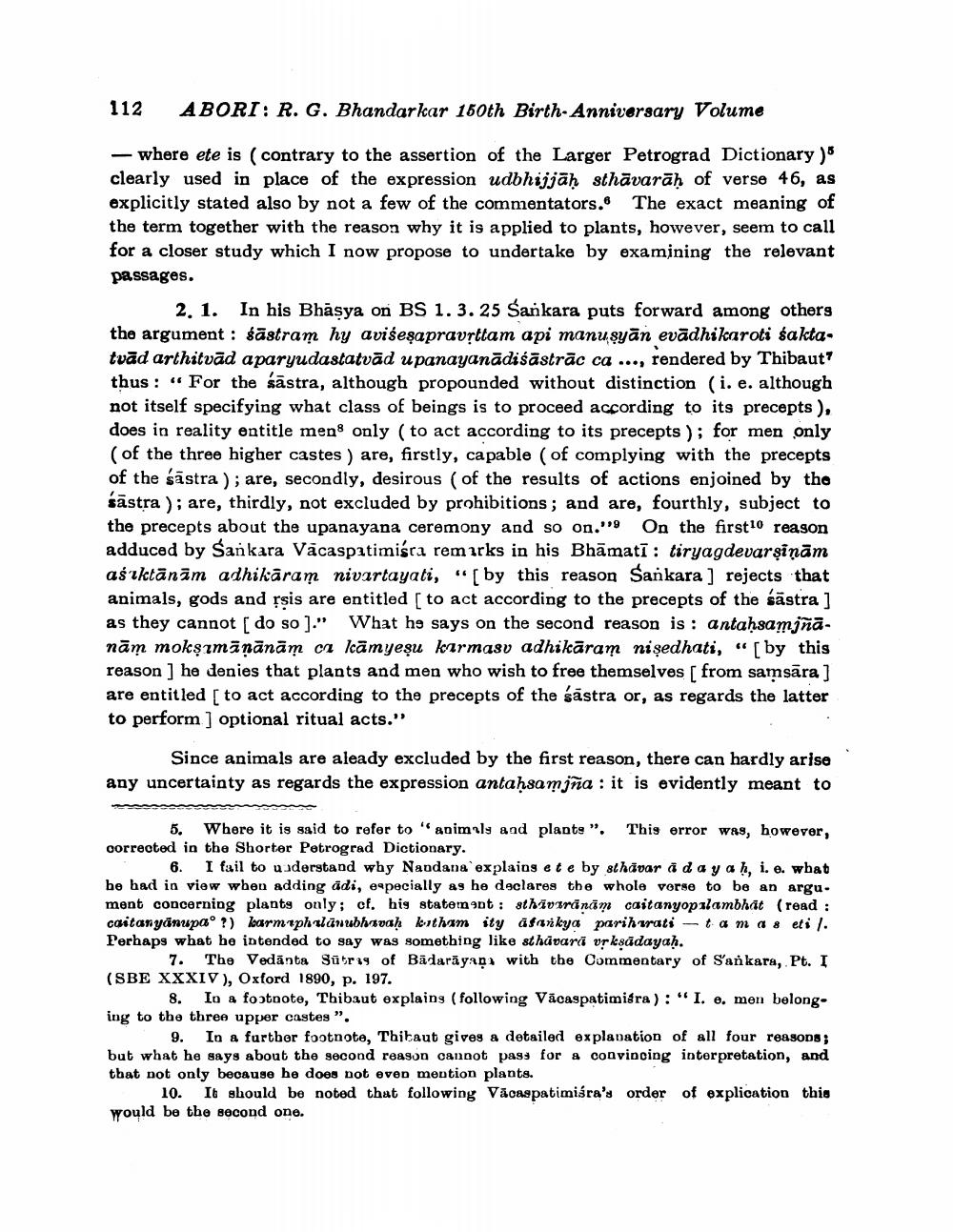Book Title: On Term Antahsamjna Author(s): A Wezler Publisher: A Wezler View full book textPage 2
________________ 112 ABORI: R. G. Bhandarkar 150th Birth Anniversary Volume - where ete is (contrary to the assertion of the Larger Petrograd Dictionary ) clearly used in place of the expression udbhijjah sthāvarāḥ of verse 46, as explicitly stated also by not a few of the commentators. The exact meaning of the term together with the reason why it is applied to plants, however, seem to call for a closer study which I now propose to undertake by examining the relevant passages. 2.1. In his Bhāsya on BS 1. 3.25 Sankara puts forward among others the argument: śāstram hy aviseşapravșttam api manusyān evādhikaroti sakta. tvād arthitvād aparyudastatvād upanayanādiśāstrāc ca ..., rendered by Thibaut? thus : " For the sāstra, although propounded without distinction (i. e. although not itself specifying what class of beings is to proceed according to its precepts), does in reality entitle mens only (to act according to its precepts ); for men only (of the three higher castes ) are, firstly, capable of complying with the precepts of the sastra ); are, secondly, desirous of the results of actions enjoined by the sāstra ); are, thirdly, not excluded by prohibitions; and are, fourthly, subject to the precepts about the upanayana ceremony and so on."9 On the first 10 reason adduced by Sankara Vacaspatimiśra remarks in his Bhāmati: tiryagdevarşinām aśıktānām adhikāram nivartayati, " ( by this reason Sankara ] rejects that animals, gods and șsis are entitled [to act according to the precepts of the sästra ] as they cannot [ do so ]." What he says on the second reason is: antaḥsamjnanām mokşımāņānām ci lcāmyeşu kirmasv adhikāram nişedhati, “ [ by this reason ] he denies that plants and men who wish to free themselves [ from samsāra ] are entitled [ to act according to the precepts of the sästra or, as regards the latter to perform ] optional ritual acts." Since animals are aleady excluded by the first reason, there can hardly arise any uncertainty as regards the expression antaḥsam jña : it is evidently meant to 5. Where it is said to refer to "animals and plants". This error was, however, oorrected in the Shorter Petrograd Dictionary. 6. I fail to uiderstand why Nandana explains et e by sthåvar å day ah, i. e. what be had in view when adding adi, especially as he declares the whole vorse to be an argument concerning plants only; cf. his statement : sthivirinam caitanyopilambhat (read: caitanyānupao?) karm ophulanubhsah kertham ity afskya pariharati - tam a seti . Perhaps what he intended to say was something like sthavari vr ksādayaḥ. 7. The Vedānta Sütrig of Bādarāyan with the Commentary of Sankara, Pt. I (SBE XXXIV), Oxford 1890, p. 197. 8. Io a footnote, Thibaut explains (following Vācaspatimisra): “I. e. men belonging to the three upper castes". 9. In a further footnote, Thibaut gives a detailed explanation of all four reasons ; but what he says about the second reason cannot pass for a convincing interpretation, and that not only because he does not even mention plants. 10. It should be noted that following Vācaspatimiára's order of explication this would be the second one.Page Navigation
1 2 3 4 5 6 7 8 9 10 11 12 13 14 15 16 17 18 19 20 21
